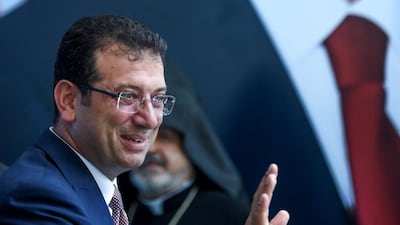For generations of pious Turks, the Hamidiye brand has long been their preferred mineral water. But since the secularist opposition took control of Istanbul, the company has lost important contracts, with some claiming the loss of business is politically motivated.
Critics see the development as part of a scheme to deprive Istanbul municipality, which owns the firm, of resources in a city that for 25 years provided the ruling Justice and Development Party (AKP) and its predecessors with a crucial source of patronage.
“The loss has stymied patronage networks that have been highly instrumental in expanding the party’s voter base,” said Mustafa Sonmez, a veteran writer and economist, referring to AKP defeats in local elections earlier this year.
Founded by Sultan Abdul Hamid II at the start of the last century, Hamidiye Water has seen deals with a number of key public sector bodies cancelled since the Republican People’s Party (CHP) candidate Ekrem Imamoglu won Turkey’s largest metropolis in a June re-run.
In recent weeks, the company has also been hit by social media claims that its product is tainted by being produced alongside raki, Turkey’s traditional alcoholic tipple.
When airport service provider TGS announced it was cancelling its contract with Hamidiye last month it joined a list including government ministries, state-run Vakifbank and Turkish Airlines.
Other developments have heightened claims that Istanbul is being targeted by central government.
Last week, the Urbanisation and Environment Ministry announced a draft law that would end the municipality’s 10 per cent share of the toll revenue from the Bosphorus bridges.
The same proposal also outlined plans to switch control of development on the shores of the Bosphorus — the most expensive real estate in the city — from the municipality to a central government body and two agencies whose boards will be appointed by the president.
The council is also involved in a legal challenge after its bid to run facilities at the historic Sirkeci and Haydarpasa rail stations, currently undergoing renovation, was blocked. The contracts instead went to an AKP-tied consortium.
Tarik Balyali, a CHP city councillor, claimed the changes are part of a politically motivated boycott.
"They are not doing this for economic reasons," he told The National. "Before the local election they didn't have any need for these kind of changes and suddenly, after Imamoglu's victory, they started doing these things."
He suggested the AKP viewed Mr Imamoglu as a “serious competitor” and wanted to erode his power and authority.
“In the long-term we strongly believe this will not strengthen the government but weaken them,” Mr Balyali said. “They will lose credibility in the eyes of the people because the people know what is being done is because of the election result.”
Having lost Istanbul, as well as capital Ankara and most of Turkey’s other major cities, some suggest the AKP government is seeking to limit the resources available to opposition mayors as well as demonstrate that it still holds the reins of power.
“The AKP is trying to give the message to its voters that the result of the municipal elections isn’t so important, that ‘We’re still powerful and we can do as we want. We can govern Istanbul from Ankara’,” Mr Sonmez said.
“They need to consolidate their support because they’ve seen that they are losing voters.”
Since becoming mayor, Mr Imamoglu has tackled what he has called the AKP’s waste of Istanbul’s resources, cancelling contracts worth millions of dollars to AKP-related foundations and displaying hundreds of rented cars paid for by the municipality as evidence of the previous AKP administration’s profligacy.
Istanbul, which holds around a fifth of Turkey’s population and contributes about a third of the national GDP, is run with an annual budget of US$10 billion. Around $4 billion of this is controlled by 28 subsidiary companies that have been criticised for a lack of transparency.
In the run-up to the election, the municipality reported that $146 million had been allocated over the previous two years to educational and religious associations, many led by AKP-linked figures including President Recep Tayyip Erdogan’s children.
The system allowed the ruling party to dole out valuable public contracts to companies headed by its supporters.
Mr Erdogan’s office did not respond to a request for comment.

